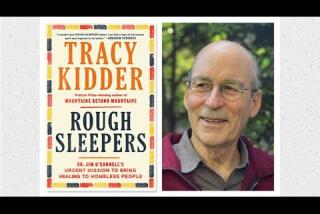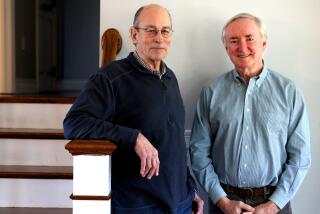Rushworth M. Kidder dies at 67; ethics expert
- Share via
Rushworth M. Kidder, a former Christian Science Monitor columnist who taught and wrote books about ethics, died March 5 of natural causes in Naples, Fla. He was 67.
His death was announced by the Institute for Global Ethics, the Rockport, Maine-based nonprofit Kidder founded to teach ethical thinking.
Kidder was a bestselling author, whose books include “How Good People Make Tough Choices” (1995), which former President Jimmy Carter praised as a “thought-provoking guide to enlightened and progressive personal behavior,” and “Good Kids, Tough Choices: How Parents Can Help Their Children Do the Right Thing” (2010).
In his books and speeches, he emphasized five “core values” — responsibility, honesty, respect, compassion and fairness. He also spoke about moral courage, which he said was not only about understanding the difference between right and wrong. He said the greatest ethical challenges involved conflicts between two core values — or as he often put it, “between right and right.” He wanted people to learn how to decide which choices represented the “higher right.”
Born May 8, 1944, in Providence, R.I., Kidder was the son of a biochemistry professor and a research assistant at Massachusett’s Amherst College, where he earned his bachelor’s degree in 1965. He went on to complete a doctorate in English and comparative literature at Columbia University in 1969 and for the next 10 years taught English at Wichita State University. He was an expert on e e cummings.
While teaching at Wichita State, Kidder began writing essays for the Christian Science Monitor, which in 1979 hired him as its London bureau chief. After two years, he joined the Monitor’s newsroom in Boston and became a columnist. He later served as a features editor.
He began writing about ethics after the devastating 1986 nuclear accident at Chernobyl in the former Soviet Union. The explosion, which killed dozens of workers and caused widespread contamination, was caused by employees conducting an unauthorized experiment. “It really was … at heart a collapse of values, a failure of conscience,” Kidder told National Public Radio in 1994.
In 1990 Kidder left the Monitor to launch the institute and spent the next two decades giving “ethical fitness” workshops at corporations and schools and lecturing to groups around the world.
He is survived by his wife, Anne Elizabeth Davidson Kidder, and two daughters.
More to Read
Start your day right
Sign up for Essential California for the L.A. Times biggest news, features and recommendations in your inbox six days a week.
You may occasionally receive promotional content from the Los Angeles Times.


















































